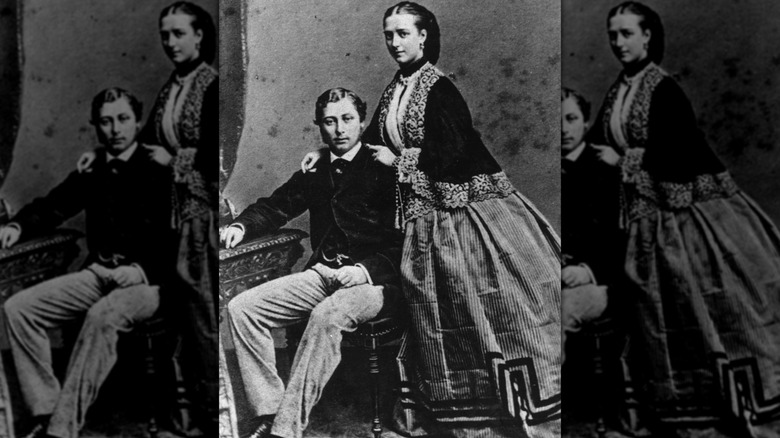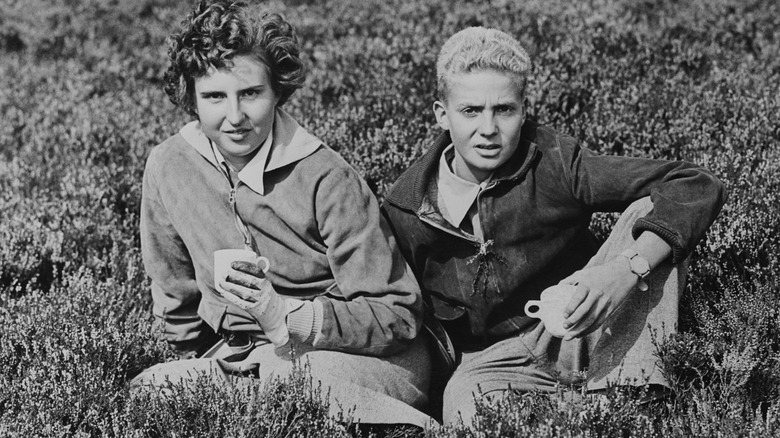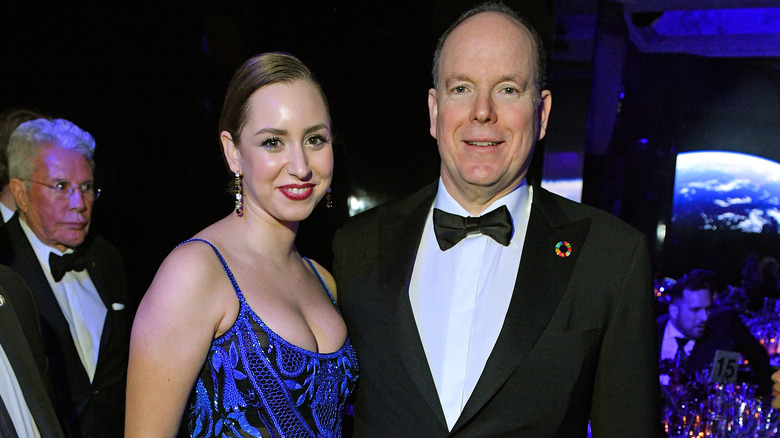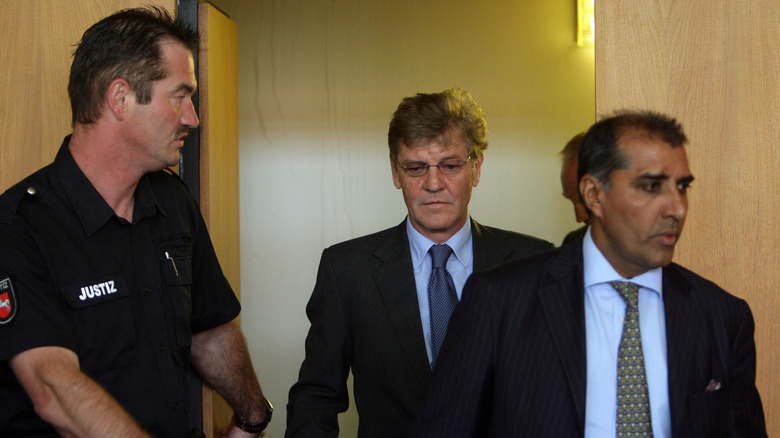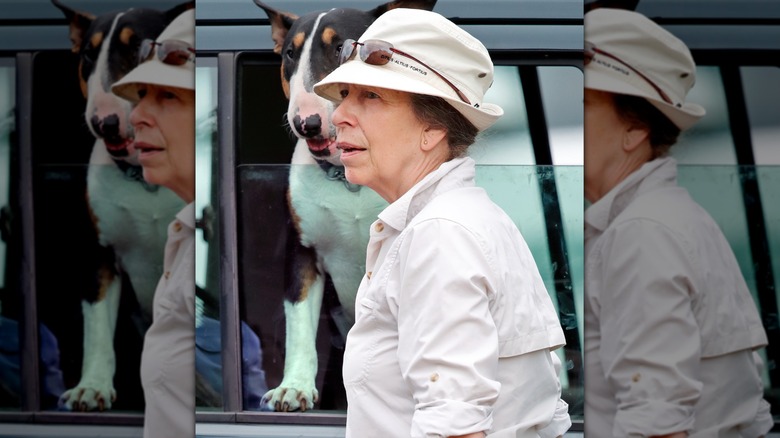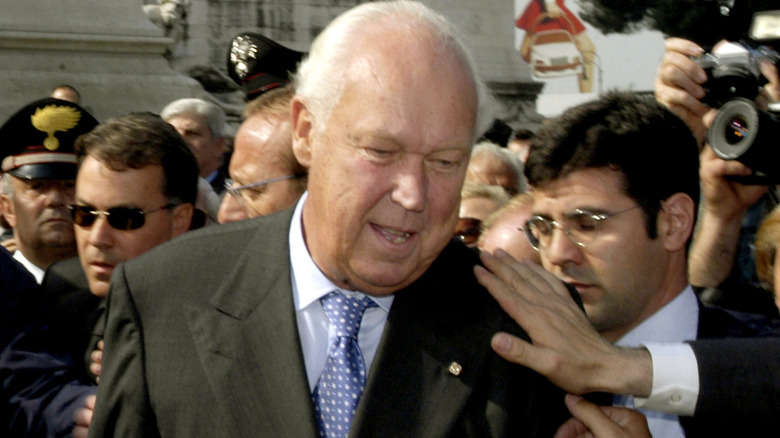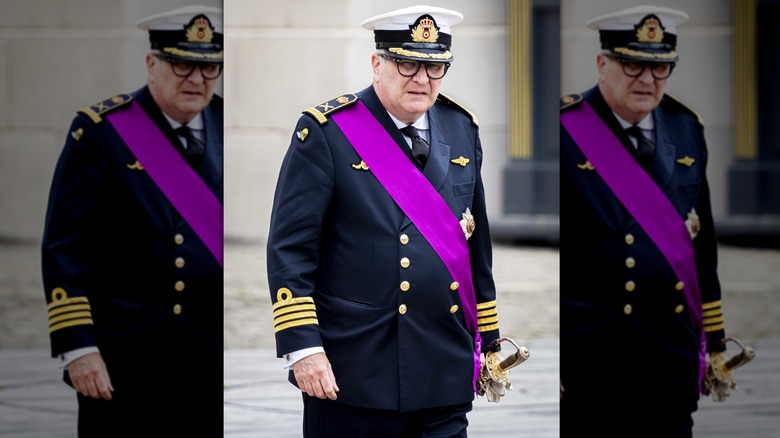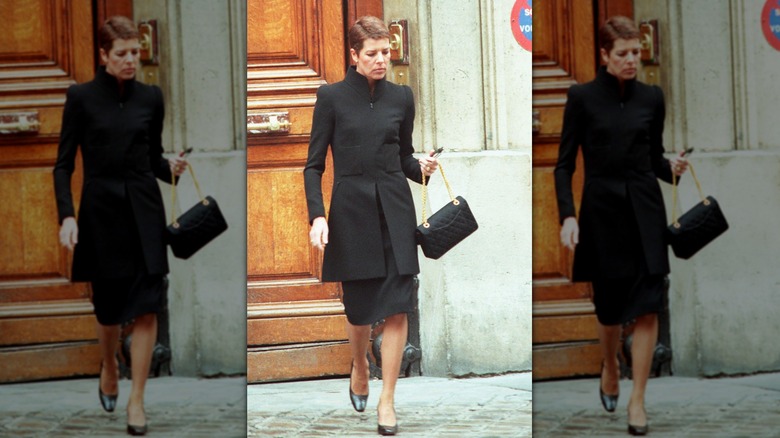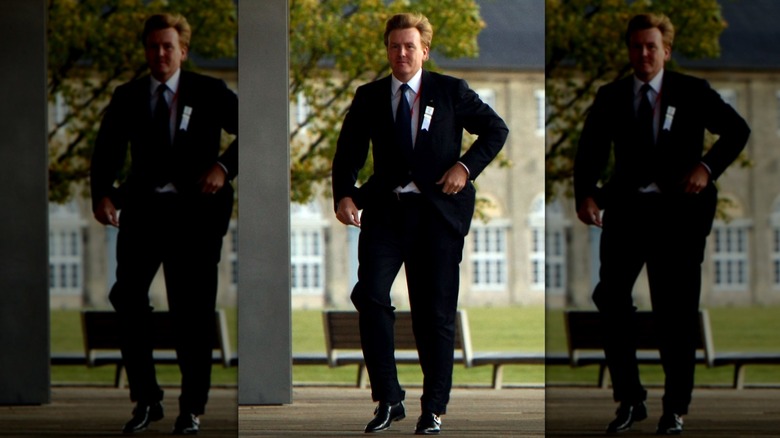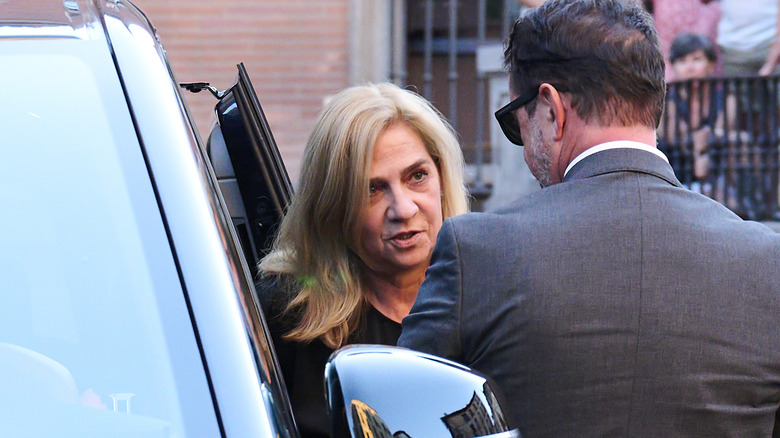Princes And Princesses Who Got Into Legal Trouble
European royals may live lavish lives, but they also have a difficult job. They must christen ships, smile for the cameras, and uphold centuries of protocol — including royal rules regarding bathroom use. These duties are so challenging that many royal wives have found the palace to be miserable. Princess Diana, Sarah Ferguson, Duchess of York, and Meghan Markle, Duchess of Sussex, have all buckled under the pressure at one point or other. Prince consorts, like Prince Philip, have also struggled immensely. As King Charles III once told the Mirror's James Whitaker, marrying outside of a major European royal family can be complicated. After all, few people understand royal duty before actually wearing a crown.
Of course, not all people born into royalty manage to uphold the high standards expected of their rank. Many princes and princesses have floundered under the pressures of royal life — partying too hard, spending too much, and even getting into trouble with the law. Over the years, many of Europe's highest-ranking individuals have found themselves wrapped up in complicated legal situations, and some princes and princesses have even found themselves thrown behind bars.
Queen Victoria's son was embroiled in a gambling trial
Queen Victoria had nine children, and her least favorite was likely her eldest son and heir — the future King Edward VII. During the time when Edward was still the Prince of Wales, Victoria admonished him endlessly for what she viewed as his frivolous personality. She was shocked at how little he enjoyed his schooling. She felt displeased by his spoiled temperament. And, even as he grew older, Victoria refused to give her son any significant responsibilities. After all, she was convinced that Edward was somehow morally inferior to the rest of the royal family.
This dynamic only worsened in 1890. At the time, Edward was a frequent partier with a penchant for the illegal gambling game baccarat. Although he was never arrested for this indulgence, Edward did get into trouble for it. One of his gambling mates accused the other of cheating, and the latter retaliated by accusing the former of slander. The two men went to court, where Edward was called in as a key witness. This proved highly embarrassing for the prince — and the rest of the monarchy as a whole — as his testimony essentially forced him to admit to illegal behavior.
According to one write-up of the trial, which was later reprinted by The Guardian, Edward was so uncomfortable that his "face was observed to flush considerably, and then pale again, showing the state of nervousness in which he found himself."
Spain's former king shot his brother
In 1956, when King Juan Carlos I of Spain was still an 18 year-old prince, he was playing with a .22 caliber gun. There are several witness statements describing what happened next, but each and every one of them contradicts the rest. The only thing that everybody agreed on was that Juan Carlos' weapon was fired, and his brother, Infante Alfonso, subsequently died of a gun wound.
Vittorio Emanuele, Prince of Naples, claimed that he was present for Alfonso's death. Speaking to the Spanish investigative journal, El País, the Italian prince recalled, Juan Carlos "didn't shoot him directly but through the closet. I was there. It was 100% an accident. I hid my gun, otherwise, they would have said it was my fault."
Despite the sincerity of Vittorio Emanuele's claims, it is difficult to take his word for it. In normal circumstances, Juan Carlos' intention would have been determined in the court of law. Considering that Alfonso died in Portugal, one would think that Juan Carlos would be tried there. For some reason, however, the Portuguese police never pursued a case against the Spanish prince, and Alfonso's body was never even autopsied. Whatever was decided between Juan Carlos and the local government, the resulting legal arrangement was never revealed to the public.
Prince Albert of Monaco was sued for paternity during the 1990s
Prince Albert of Monaco is no stranger to legal troubles. As a popular royal with a playboy reputation, Albert has been accused of fathering royal love children time and time again. As the prince's long-time friend, Stéphane Bern, revealed in a very telling conversation with Town & Country, "One day Albert told me, 'Oh, if I listened to all the claims, I would have more children than anybody else in the world.'"
In 1992, though, Albert found himself in a unique position. A woman by the name of Tamara Rotolo had filed a paternity claim against him in her home state of California. Rotolo had, indeed, been one of Albert's dates just months before. And, at the time, Albert and his family were planning a trip from Monaco to New York. Rotolo ostensibly hoped that Albert would be able to take advantage of his trip stateside to respond to the claims. Instead, he brushed them off — knowing that the state of California did not have the jurisdiction to require him to take a DNA test.
In the end, Albert had a change of heart. Fourteen years after the original paternity claim was filed, the prince finally agreed to a voluntary DNA test. The results confirmed that Rotolo's daughter, Jazmin Grace Grimaldi, was his child. Since then, Albert has done everything in his power to make up for his absence — including purchasing Jazmin a pricey New York apartment.
Prince Ernst of Hanover was convicted for attacking journalists
Prince Ernst of Hanover might be Europe's most badly behaved royal. He's kicked the paparazzi, attacked a hotelier with a metallic ring, and even been photographed urinating in public. One of the worst incidences involving the prince, however, was almost certainly the time he was convicted of attacking four people.
In 2001, the BBC reported that Ernst had been accused of physically assaulting two journalists, a restauranteur, and a photographer. He was also said to have spewed quite a bit of rude language at all parties. Given the nature of these accusations, Ernst was tried in the German court of law. There, he was ordered to pay a $228,000 fine. Ernst was reportedly found responsible for causing bodily harm, exhibiting threatening behavior, and engaging in verbal abuse.
Although one would hope that the prince would learn his lesson after this initial sentencing, he would go on to become a repeat offender. In 2023, Ernst was arrested on charges of property damage after he allegedly yanked a traffic sign out of the earth and shattered a window at the Duke of Cumberland Foundation.
Princess Anne was fined for unruly canines
In many ways, Princess Anne has been a model royal. She has not been at the center of any major royal scandals. She represented her country at the Olympic Games. And, she is known as one of the hardest-working members of the modern monarchy.
That being said, no one is perfect, and Anne has not managed to avoid legal challenges over the course of her lifetime. This was especially true in 2002 when the princess royal was accused of losing control over an English bull terrier that she had affectionately named Dotty. As per Hello!, Dotty bit and subsequently injured two children at Windsor Great Park. One of the children endured scratches on his back, arm, and leg. The other suffered two painful bites — one on his leg, and one on his collarbone.
In Great Britain, the Dangerous Dog Act makes it illegal for owners to lose control of their dogs — particularly those of more aggressive breeds. As Anne was unable to prevent Dotty from attacking the children in question, she was accused of being in violation of the law. She pleaded guilty to the resulting charges. The princess royal thus became the first high-ranking member of the royal family to be convicted of a crime.
Vittorio Emanuele, Prince of Naples, was embroiled in a corruption scandal
Vittorio Emanuele, Prince of Naples, came from a long line of Italian royalty. However, as Italy abolished the monarchy in 1946, he was never crowned king. Instead, Vittorio Emanuele became a major source of scandal when a Potenza-based prosecutor investigated him for corruption. As reported by The Guardian in 2006, the prince was accused of accepting large sums of cash in exchange for securing licenses for gambling machines. The prosecution also alleged that Vittorio Emanuele had helped traffic women from Eastern Europe to be sold into prostitution in Italian casinos. The prince denied involvement in the corruption and human trafficking schemes.
Although Vittorio Emanuele was ultimately acquitted of these crimes, he did spend quite a bit of time behind bars. The Italian prince was jailed for a week — while his case was being tried and deliberated in court. As reported by Italy Magazine, Vittorio Emanuele did not receive any special treatment due to his rank. To the contrary, it is believed that he was arrested at gunpoint. In the end, though, there was not enough evidence to link Vittorio Emanuele to the illegal activities at hand, and he was permitted to regain his freedom.
Prince Laurent of Belgium was investigated for corruption
In 2006, Prince Laurent of Belgium was investigated for corruption. Long considered a big spender, Laurent had a reputation for purchasing pricey watches, nice clothes, and fast cars. He also lived in a gorgeous home called Villa Clémentine. And, before long, high-ranked investigators began to wonder how the prince could possibly afford his expensive home renovations, given the extent of his spending habits. Eventually, Laurent was accused of stealing Belgian naval funds and using them to refurbish his residence.
When questioned about his economic activities, Laurent denied the accusations made against him. He was then questioned by the Belgian police and subpoenaed. Ultimately, he appeared in court, where he testified that the money that had been used to renovate his home was not stolen.
Although the prince was not officially on trial as a criminal suspect, his involvement in this scandal proved terribly embarrassing for his parents, King Albert II and Queen Paola of Belgium. Even after the court accepted Laurent's story, Albert and Paola punished their son by banning him from all royal functions for four months.
Princess Caroline of Monaco lost a fight for privacy
Unlike other royals, Princess Caroline of Monaco was practically born into a complicated legal situation. As the first-born daughter of Rainier III and the American actor, Grace Kelly, Caroline attracted quite a bit of media attention from the start. However, as the princess grew older, she found it practically impossible to protect her privacy. Indeed, the press followed her life closely — reporting on every one of her nightclub outings, romantic squabbles, and downtown strolls. This created a tremendous amount of stress for Caroline, who simply wanted to live out her days in relative peace. As such, the princess felt that she had no choice but to go to court.
As reported by the BBC, Caroline submitted a complaint to the European Court of Human Rights, arguing that the media was not respecting her privacy. She specifically pointed to a 2002 photograph of herself, Rainier, and Prince Ernst of Hanover that had been published in the papers. In her view, a private walk with her father and husband was not news-worthy — and therefore did not need to be circulated by news outlets.
Unfortunately for Caroline, however, the European Court of Human Rights disagreed with her argument and rejected her claim. At the time that the photograph had been taken, Rainier was not in particularly good health. As such, it was determined that a picture of the prince strolling through St. Moritz was appropriately newsworthy.
When he was a prince, King Willem-Alexander was accused of getting involved in a corrupt project
Back in 2009, when he was still the Crown Prince of the Netherlands, King Willem-Alexander wanted to buy a house in Mozambique. The development where he was planning to make his purchase had been touted as an important contribution to the local community, and Willem-Alexander ostensibly believed that his decision would be met with positivity. He could not have been more wrong.
In reality, there were whispers that the development in question was actually a massive corruption scheme. Some Dutch citizens even expressed concern over whether the project should be stopped altogether. Although Willem-Alexander was not brought to the court of law over this scandal, he was confronted by the Oranjeverenigingen — a conglomerate of 400 unions that admonishes the royal family when its members fail to adhere to proper behavioral standards. Indeed, Michiel Zonnevylle — the then-chairman of the Oranjeverenigingen — insisted that the prince step away from his property.
This intervention ultimately proved successful. It spurred months of parliamentary debate, as well as dozens of news articles that questioned Willem-Alexander's sketchy home ownership situation. Even though the prince did try to fight the public pressure, it ultimately became too much. By 2012, he had sold his house in Mozambique for almost nothing.
Infanta Cristina of Spain faced criminal charges for embezzlement
It's rarely easy for a prince or princess to select a life partner. After all, one wouldn't want to wed someone who would somehow embarrass the crown. Unfortunately, Infanta Cristina of Spain learned this lesson the hard way in 2017 — when her husband, Iñaki Urdangarín, went to prison for tax evasion among other charges. Urdangarín, who had previously competed in the Olympic Games, was also accused of embezzling €6 million from a non-profit organization called Noos Institute. According to prosecutors, he overcharged for events in order to hide funds in his own personal accounts.
As expected, the Spanish royal family was humiliated by this episode. Making matters worse, Cristina was accused of tax evasion alongside her husband. Although she was ultimately acquitted of these accusations, the princess had to stand trail. She was also fined €265,000 — meaning that the court of law did not view her as 100% blameless. This was a historic moment for the Spanish monarchy, which had largely avoided court spectacles in recent years. As NPR's Lauren Frayer reported at the time, "Princess Cristina was the first royal to face criminal charges in Spain's modern history."
Princess Charlene of Monaco was accused of hiring illegal migrants
Princess Charlene of Monaco has been accused of making a number of poor financial situations over the years. Claude Palmero — the palace's former accountant — even went to the press to complain about what he views as Charlene's excessive spending. Speaking to Le Monde in 2024, Palmero claimed that Charlene would occasionally overdraft her bank accounts by hundreds of thousands of euros. The royal accountant also revealed some of his own diaries — which contained some pretty serious accusations against Charlene.
Per Palmero's notes, Charlene was known for employing childcare professionals who lacked the proper documents to work in the European Union. "Update on the hiring of nannies ... We're in the middle of an illegal situation (even their tourist visas expired on January 7)," he wrote. Upon further investigation, Palmero found that at least one of the nannies in question had no legitimate identifying document whatsoever. "Not only are they in an illegal situation, but one entered with a fake passport," he added. Apparently, both Prince Albert and Charlene were aware of the nannies' precarious legal situation but did nothing more than "take note."
The Prince's Palace of Monaco has denied Palmero's claims. "At the palace, Mr. Palmero was solely responsible for human resources and recruitment," said royal lawyer Jean-Michel Darrois. "An audit has been launched and, obviously, if it turns out that there have been any irregularities, they will be put an end to immediately."

